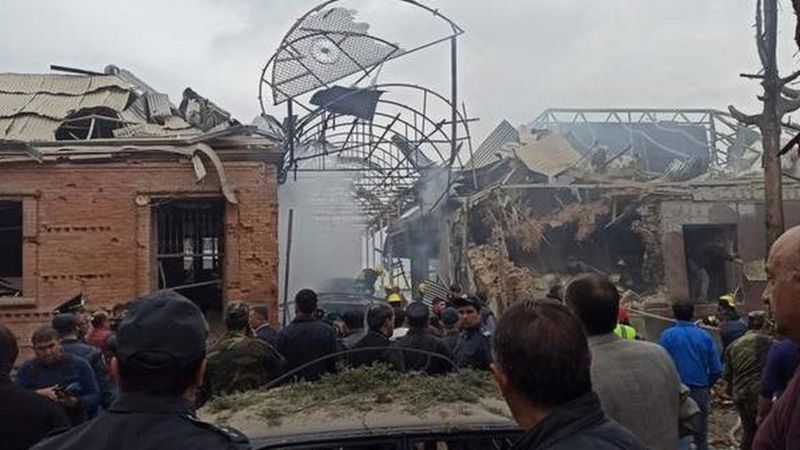Inside the rural Texas town where Elon Musk is basing his business empire
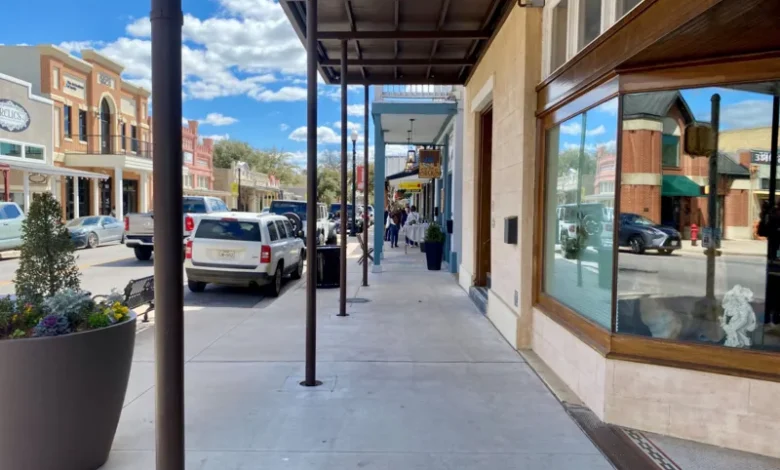
After fleeing Silicon Valley for political and business reasons, Elon Musk is building a corporate campus in rural Texas – but his new neighbours have mixed views.
Half an hour east of Austin, past the airport, the clogged-up traffic starts to melt away and the plains of Central Texas open up, leaving the booming city behind.
Somewhere along the main two-lane highway, a left turn takes drivers down Farm-to-Market Road 1209. It seems like an unlikely address for a high-tech hub, but that’s exactly what Elon Musk, the world’s richest man and one of President Donald Trump’s closest allies, hopes it will become.
Court filings indicate that a large metal building finished in the last few months will be the new headquarters of X, his social media platform.
A short distance away, a large logo of the Boring Company, Musk’s infrastructure company, is plastered on the side of another headquarters. And across FM 1209 is a rapidly growing SpaceX facility which manufactures Starlink satellite internet equipment.
Like most technology tycoons, Musk had long made Silicon Valley his home and headquarters. Once a supporter of the Democrats, his move to Texas is part of a larger tech world trend and also appears to reflect his own transformed ideological views.
Here the land is (relatively) cheap, skilled tech workers from nearby Austin are plentiful, and local laws are favourable to development.
Of course, there are also specific political angles to the move.
In July 2024, Musk said he was quitting California after the state passed a law prohibiting teachers from enforcing rules about notifying families when students’ gender identity changes.
Musk has an estranged transgender daughter and has spoken out against what he calls “woke mind virus” – which he describes in interviews as divisive identity politics – along with anti-meritocratic and anti-free speech ideas.
And so Musk upped sticks and headed to Texas, a Republican stronghold and the fastest-growing state in the US.
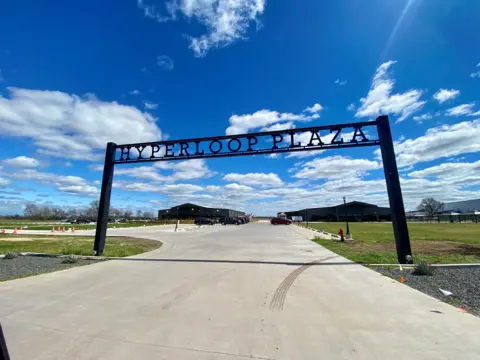 BBC/Mike Wendling
BBC/Mike WendlingIn addition to the cluster of buildings near Bastrop in central Texas, he has built a SpaceX facility in Cameron County, on the southern tip of Texas near the border with Mexico. SpaceX employees there have filed a petition to create a new town called Starbase. The measure will go to a vote in May.
Locals in Bastrop have mixed feelings about the development.
“It’s almost like we have a split personality,” says Sylvia Carrillo, city manager of Bastrop, which has a growing population of more than 12,000. “Residents are happy that their children and grandchildren will have jobs in the area.
“On the other hand it can feel like we are being overwhelmed by a third party and that the development will quickly urbanise our area,” she says.
Although the Musk development is technically outside of the city’s limits, it’s close enough that Texas laws give Bastrop’s government sway over development. And, Ms Carrillo stresses, the Musk buildings are just one example of many developments springing up in a booming area.
“He’s faced a backlash that is not entirely of his own creating,” she says.
“But now that he’s here and things are changing quickly, it’s a matter of managing” issues like house and land prices and the environment, she says.
The Musk compound is still fairly bare-bones. The grandly named Hyperloop Plaza sits in the middle of the corporate buildings, and is home to the company-owned Boring Bodega, a bar, coffee shop, hairdresser and gift shop.
On a recent windy Sunday afternoon, a video game console sat unplayed in front of a couch near a display of company T-shirts, while a few children scurried back and forth to a playground outside.
The developments in Bastrop fit right into the quickening pace of activity across central Texas, where cranes perpetually loom above the Austin skyline and the housing market is a perpetual topic of conversation.
The area has gone through various industry booms and busts over the years, including lumber and coal mining, says Judy Enis, a volunteer guide at the Bastrop Museum and Visitor Center.
During World War Two, tens of thousands of soldiers – and around 10,000 German prisoners of war – poured in to Camp Swift, a US Army facility north of the town.
“That probably had more of an impact than Elon Musk,” Ms Enis notes.
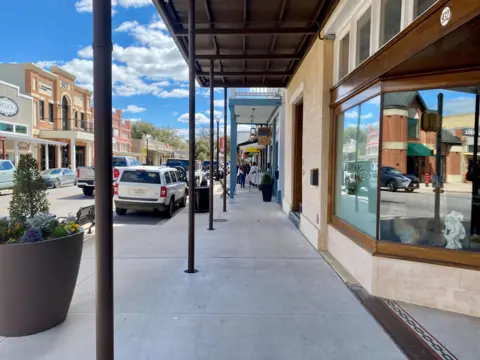 BBC/Mike Wendling
BBC/Mike WendlingViews of the tycoon are mixed, to say the least, and inseparable not only from his politics but also opinions on economic development, in what still is a predominately rural area.
Judah Ross, a local real estate agent, says the development has supercharged population growth that started as a result of the Austin boom and accelerated during the Covid pandemic.
“I’m always going to be biased because I want the growth,” Mr Ross says. “But I love it here and I want to be part of it.
“If nothing else, what’s good is the amount of jobs that this is bringing in,” he says. “In the past year, I’ve sold to people working at Boring and SpaceX.”
Alfonso Lopez, a Texan who returned to the state after working in tech in Seattle, says he initially picked Bastrop figuring he would make a quick buck on a house purchase and move on.
Instead, he quickly became enamoured with the town, its mix of local businesses and friendly people, and wants to stay.
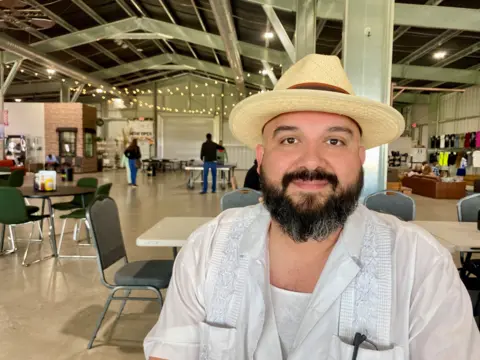 BBC/Mike Wendling
BBC/Mike WendlingMr Lopez is no big fan of Musk and is critical of some of his management practices and politics, but admires the technology his companies have built and is happy to live nearby as long as the companies are good neighbours.
“As long as they don’t ruin my water or dig a tunnel beneath my house and create a sinkhole, this isn’t bad,” he says, gesturing around the metal shed housing the bodega, coffee shop and bar. “I’ll come here and watch a game.”
His concerns about water are more than theoretical. Last year The Boring Company was fined $11,876 (£8,950) by the Texas Commission on Environmental Quality after being cited for water pollution violations.
The Boring Company initially planned to dump wastewater in the nearby Colorado River but, after local pressure, signed a deal to send the sludge to a Bastrop wastewater treatment plant.
The water issues appear to have delayed housebuilding, which reportedly could include more than 100 homes for Musk employees. The planned development of homes has so far failed to materialise, however. For now, the extent of living quarters is a handful of temporary trailers behind the bodega building, surrounded by a wall, acres of Texas plain and a few horses munching grass. Ms Carrillo, the city manager, says any large-scale home building is at least a year off.
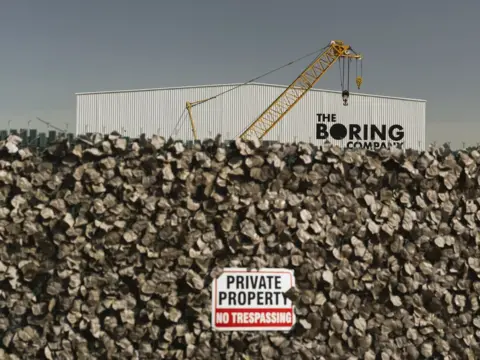 Getty Images
Getty ImagesIn November, SpaceX applied for a free trade zone designation, which would allow it to move materials and finished products in and out of the Bastrop factory without being subject to tariffs – one of Donald Trump’s signature policies.
It’s a common practice for manufacturers, and there are hundreds of similar zones across the country.
Local officials in Texas have endorsed the proposal, saying it will boost the local economy, despite costing the county an estimated $45,000 (£34,800) in revenue this year.
The company is also getting an injection of $17.3m (£13.4m) from the Texas government to develop the site, a grant that officials say is expected to create more than 400 jobs and $280m in capital investment in Bastrop.
Few local residents wanted to directly criticise Musk when standing face-to-face with a visiting reporter. But it’s a different story online, where sharper feelings shine through.
“They will ruin everything nearby,” one resident posted on a local online forum. “Nothing good comes with him.”
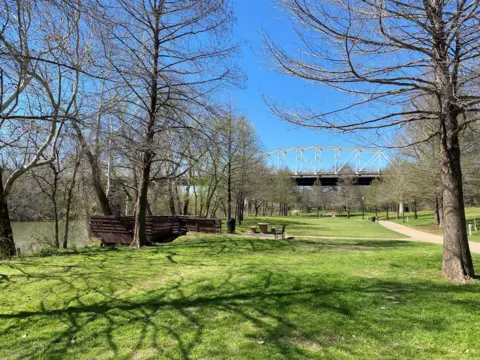 BBC/Mike Wendling
BBC/Mike WendlingThe BBC contacted SpaceX, The Boring Company and X for comment.
Ms Carrillo, the city manager, says she hasn’t picked up on much personal anger on the part of locals prompted by Musk’s activities in Washington.
But to protect Bastrop, she says, the city has recently enacted laws limiting housing density and providing for public parks – measures that she says will keep the “historic nature” of the well-preserved downtown while allowing for growth on the outskirts.
Bastrop, she says, is a conservative, traditionally Republican place.
“His national stuff doesn’t really register,” she says. “His companies have been good corporate citizens, and we hope it can stay that way.”
Source: bbc.com





